#and i cant believe im complaining about something as mundane as this i just. feel like shit rn
Explore tagged Tumblr posts
Text
,
#the harder i swim the faster i fucking sink#i actually tried my best to like. do something today. went to my sport practice that ive been skipping for weeks#and it sucked and i didnt like it and the girls there all ignored me (obviously because im never fucking there)#and i had to train with this tiny fucking annoying kid who kept walking away and leaving me alone#so i couldnt fucking do anything#and now im home and my entire body hurts and my mum told me to go away and im just. fuck !!#i KNOW its late and im just tired but dude im tired of my entire fucking life#i tried to pick out nice clothes today to help me feel better (bc i had been scrolling pinterest and was feeling so inspired)#but that just made me miserable <3 because im not a fucking pinterest girl and my closet is just random shit#not some fucking. aesthetic . and i never own the clothes that i wanna wear at that moment but i also can never find things i love in stores#and i cant believe im complaining about something as mundane as this i just. feel like shit rn#tried to do some painting and it didnt work bc i had zero inspiration and everything i made looked ugly as hell! so that was fun#i fucking. need to change something up. cut my hair weed out my closet change my room. because i am feeling sooo stuck in this life#first tho. i will go to bed#because of course i have fucking work tomorrow. i cant WAIT until april when i can finally stop at this fucking job#(well i say can. they fired me <3 but who cares i wanted to quit anyway)#this has been. a long rant. oops#i just hate that so often when i try to make a positive change it just . fucking sucks#but what can i do about it. not much!#goodnight anyone who read all this i'm sorry#sas.txt
0 notes
Text
big media roundup (july edition)
hellooo again welcome to my media roundup, where i talk about things i read/watched/played this month! (…and by last month i mean AN ENTIRE MONTH AGO. WOOPS in my defense i got sick [better now]) in july i downloaded tachij2k, which im going to be shilling forever as the best way to read manga on android (apk on github here) this also means that ive been reading like, a Lot of manga lol so i split books + comics into two.
books:
vita nostra by Marina and Sergey Dyachenko: a metaphysics-ish novel about a girl who is blackmailed into going to a magic school. sort of a subversion where (unlike many magic school books) it basically is all about learning and stuff? im kind of a sucker for books written by married couples i think its really cute and also kind of fascinating... um i sort of disagree with its approach to pedagogy but its also sort of about the blood sweat and tears part of learning,, where i usually quit beforehand LOL. got that eastern european hopeless and drudgery (?) but idk i would definitely recommend
the great believers by rebecca makkai: historical fiction that swaps between an art curator-y guy living through the aids epidemic in chicago and his friend in the present who is trying to reunite w her estranged daughter. i really liked this!! super devastating obviously literally scooped me like a melon. very well researched! i hadnt really grasped like. the sheer terror and paranoia? that happened during the aids epidemic before..... thats my lack of contemp history knowledge but it was good i learned a lot. liked the theme of sort of surviving through tragedy and even after.. and the line drawn between the lost generation (war) and yales own exp (EDIT: found sth i wrote after reading the book which said "people are living their own intricate and mundane stories and then the stories of the world smash straight through them")
assassin of reality (vita nostra sequel): sasha knows what she will become--has embraced it, even. but theres always something that can be lost, and the institute still has a heavy hand over her.<or sth like that??? the reveals of the last book kind of make it a hard act to follow and the book definitely felt a lot more abstract... ik some people complained about the romantic subplots but i feel like it gives stakes and grounds everything else, yk? it gives you a thread to hold onto otherwise i mightve given up LMFAO that being said i did enjoy it :3 wondering if what happened to the authors will change the vibe of the next book... :(
you exist too much by zaina arafat: literary fiction about a bisexual palestinian american woman who struggles with her addiction to unattainable love, which has led her to cheat in several relationships. this book didnt really resonate with me.. um i actually ended up writing like 500 words of review for this but its pretty negative. so if youre interested check it out here https://cdn.discordapp.com/attachments/970847361775591466/1147613251933306921/image.png
movies/tv: room with a view: a young english girl travels to italy and finds love there--but has to choose between that love and a 'proper' life. ok this was fine. idk it was cute and funny sometimes but didnt leave that much of an impression sorry :T
past lives: two childhood friends reconnect, lose touch, then reconnect again. aughjjj those two silent minutes where they were waiting for her ride were so freaking agonizing. really good acting pretty film i just enjoyed it a lot in general! :3 i didnt like the boyfriend that much at first but the conversation they had in bed made them feel like a real relationship, you know? wish theyd had a 3some though maybe it will happen in past lives 2: paster life. idk its like most of the time we dont grow up to be who we thought wed be or do what we thought wed do... but is that really so bad? cant you still be happy? *clutches my head
nimona (movie): adaptation of the comic above! um this was fine i think i was a little disappointed bc the jokes felt a little overplayed/didnt really land? and i was mentally comparing it to the comic but then rereading i was like oh these jokes dont really hit for me either.. so who am i comparing this to LOL i think it would have meant a lot to me in middle school, so maybe it will mean something to middle schoolers now. also ppl fought really hard for it to be made so i feel like i need to give it more credit. my mutuals meta also made me appreciate it more :3 https://cdn.discordapp.com/attachments/687877902200471552/1126752893312184390/image.png barbie movie: not going to recap the barbie movie sorry. i actually watched this twice it was really fun :3 i wouldnt necessarily say it was a Cultural Milestone or anything but it was cute to see everyone dressed up for the movie.. plus i love velveteen rabbit type storylines. i think ken got the right amount of screentime (its not his movie!) but i loved his dance number and the battle scene :3 and the outfitss idk im not super caught up on the movie scene but it feels like there have been a lot of ugly movies recently. i enjoyed it
the rehearsal: a "reality" show about nathan fielder, who believes that any difficult situation can be rehearsed--and has the budget to put that belief into practice. ok like last year or sth everyone was like omg this show was sooo good but i didnt really get what it was about? but its actually really so interesting.. and the whole blurring between fiction and reality as well as the audience not really knowing which parts are staged and which parts are 'real' is so fun! i was a little bit disappointed when it diverged from the episodic format but that ended up paying off bigtime and was really like idk heartbreaking and funny and all of that. very recommend 👍
video games:
super mario odyssey: (replay)super fucking mario yay!!! in the long run, odyssey didnt have as much like. cultural staying power as botw did (they were both switch launch titles) but its still soooo imaginative and pretty and dense! i love platformers love 2 run and jump.
visual media: he was my brother: psych horror manga about a young girl who tries to grow closer to her recently-deceased brother's partner. omg i had so much fun with this the art is so atmospheric and delightfully creepy...REALLY mind the warnings though. i think i ended up reading all of it in one sitting lmfao
nimona comic (reread): classic villain ballister blackheart is looking for a competent sidekick, but what he gets is nimona, a shapeshifting weirdo kid with secrets. i remember trying to reread this and going wow.... is nimona not as good as i remember? am i old? but it was actually just like early webcomic weirdness nimona is still pretty good! yay :3 i still like the comic better but i respect how they are adapted to their respective mediums and also come from different phases in the og authors life
The story of how I came to know my favourite announcer has a side to her I would have never imagined: oneshot f/f w the premise in the title. whether i write down stuff like this is pretty hit or miss lol and i had to look this one up to rmbr what it was but the art is so cute...simple plot but i enjoyed it :3
crossplay love otaku x punk: romcom where two highschoolers fall in love with the other's crossdressing alter ego (m/m?). i really liked this one actuallyyy its so silly and im also a sucker for love square shenanigans. ok also now that someone else said they think hana/shuumei is endgame so im thinking about it. not the right perspective for this but the crossdressing isnt really overly fetishized or like seen as bad or anything? also ppl make some really funny faces in this
breathless momentum (vol 2+3): r two womanizing musicians find love... in each other!? this is also another one of my favorites :3 the leads are so fun and also music yay music! i really appreciate when a romance is still able to present an interesting story even after the couple has gotten together..
damekoi r: sequel to "please love this useless me," (damekoi is like.. useless passion? i think) which is about a woman in her 30s who spends all her money on her college boyfriend and goes into debt and falls in with her shitty former boss. omg it was soooo cute like i already said its a romance set after the main couple has already gotten together. which is my favorite. but these guys are really fucking weird so they still have a lot of problems. having Another Man who fits michikos type and isnt totally evil come in to destabilize shibata and kurosawas relationship doesnt feel cheap bc their relationship is already not very stable? lol i think the first one is worth checking out if you love pathetic women
mr villains day off: a gag manga about an alien supervillain on his days off. ok this one is pretty much just centered around this fluffy guy who likes to look at pandas but its extremely not very deep but its very cute... i like it... i also like pandas
how do we relationship/so do you want to go out, or (reread): f/f slice of life/drama manga about a girls first lesbian relationship in college. ok this is like "the" yuri manga for me i would recommend it to any fans of femslash its like sort of very realistic feeling? in the way that a relationship can sort of degrade slowly through lack of communication and being different people i think its really great 👍
ichinose familys seven deadly sins: psychological drama. an entire family wakes up with amnesia from a car crash. they dont remember themselves or each other, but pledge to stay together and relearn how to be a family and try to find their memories again. but is it really worth digging up the past...? man this one really goes off the rails. but like in a fun way? has an interesting arc going on rn about like... what allowances do we give, what are we willing to forgive in a stranger vs a family member. pretty interesting!
oshi no ko (catchup): psych thriller about the twin children of a famous idol trying to deal with the legacy she leaves behind. ive been talking about this manga for a while to my friends lol its kind of like riverdale in that its sort of very good, sort of very bad--but overall just super engrossing! which makes sense in a way bc its about the entertainment industry but also about the relationship between an idol and their fan... um not so sure about recent developments though lol. a little bit scared to see where things go
blue period (catchup): a delinquent boy used to going with the flow decides to go to the top art school in japan. yeah blue period is really good. hope this helps 👍lets all never go to art school ever ok ^_^
still sick: f/f about an office lady who finds out her coworker writes and sells yuri doujins (like illustrated fanfiction?) on the side. its a classic! was nice to finally get around to finishing it :3
liar satsuki can see death: thriller about a girl who can see peoples deaths and tries to prevent them--except everyone thinks shes just a liar. ok this is notable bc it has the exact same like adventures and gaybait as shounen but its all girls instead. its good light entertainment! sometimes is um kind of horny for sth about high school girls so ymmv on that one
farming for love: m/m romance about a pharmacist who moves to the country after a bad breakup and meets a ~strong but silent farmer~. pretty average, but fun if youre into that kind of thing! not sure if i would really recommend it lol
chainsaw man 2: set after the events of chainsaw man proper, its an action shounen focusing on asa mitaka, a girl who kinda sucks :3 chainsaw man is so fun yayyy im happy to be reading it again excited to get hit by some more bricks! asa is a wonderful protagonist and fujimoto continues to write comitragedy (?) in a way thats kinda obscene but also very cool 👍rip single father denji
skip and loafer (comic): slice of life about an ambitious but awkward girl who comes from the country to start her high school life in tokyo!!!! and some guy i guess. omg ok this is like the slice of life manga for me rn (the anime is really good! finished recently check it out) its just really warm and nice. autistic girls win always lol truly a comic that makes you feel like there is love in the world
no home: webtoon drama about two guys who are trapped together in a haunted dorm. ok this comic makes me really depressed but its also about people who make each other better despite their best efforts. and also violence and hatred its really really good 👍sad about recent updates though.. i guess maybe the characters werent really meant to be friends in the long term
this took me like two weeks to write and now im in a different state LOL so um if you got to the end...thanks for reading!
6 notes
·
View notes
Note
I dont wanna join the ovw discord youve made and I have no intent on giving blizz any money so i cannot play ovw with you BUT im a lil curious and I care abt u bc ur my friend so...... what r some of ur sigma hcs. Tell me what you think abt the funny video game man
oh god rev this ask got drowned in my notifs and im legit so mad because i would LOVE to share some hcs actually thank you so much for enabling me
- [gestures to my pinned post] he is autistic nonbinary and bisexual because i am also autistic nonbinary and bisexual so i make the fucking rules
- he floats everywhere mostly because his back always hurts. like hes capable of walking if he HAS TO but he WILL complain about it at every opportunity
- ive posted about this a bit this morningish but i do genuinely believe that he's not 'being manipulated' into joining talon and they arent 'taking advantage of his fragile state of mind' or whatever the fuck i do wholeheartedly believe he's fully aware of what hes doing and just straight up does not care. he's absolutely fed up with everything and has decided he wants violence. not because hes insaaane and crazayyayay or w/e he's just really pissed off after being forcefully institutionalized for god knows how long. i wanna reiterate i have not watched his lore video or whatever it is cuz from what i know about his story i feel it might Hashtag Trigger me lol but i have no respect for blizzards storytelling anyway so who cares
- he seems like a cat person to me
- we know he's a big classical music kinda guy. i think he'd enjoy holst's planets suite
- i HATE it when people are like omg hes baby hes so baby this grown man is an infant uwuwuwu but also like. i think hes just a nice person, like at the center of it all. hes just some guy but like in the best way. he's capable of like complete and utter destruction but he mostly minds his own goddamn business and will use his powers for like silly little mundane things like 99% of the time just because it's fun. it's like almost offputting at first because its like 'WHAT is this genuinely nice and relatively normal seeming dude doing here' but make no mistake he knows exactly what hes doing here
- he probably leans into the 'omg this guy is crazy hes unstable he has no idea whats even going on' thing, mainly cuz in his eyes if people underestimate him as being manipulated and think they can talk him out of it or try wasting time reasoning with him that'll give him the upper hand, but also in general he just really wants to be left alone. he can't be assed to clarify he is tired of explaining himself just believe whatever you want at this point
- i think he would honestly get along with the rest of the talon heroes surprisingly well just by nature of being so goddamn friendly they can't help it. what are they gonna do, get mad? he's literally just some guy. he's the type to like check with everyone if they want anything if he's about to order food just because it's rude to NOT ask, he's the 'i heard you say something about needing one of these and remembered i had one i don't use anymore, here you can have it' kinda guy, it's one of those things where you have to actively look for reasons to dislike him. i think he should get to have friends i think its what he deserves
- moira uses him to reach high shelves, not by asking him to grab things for them like a normal human being, but by literally just climbing on top of his shoulders and using him as leverage to reach whatever it is they need because they're stubborn as all hell
i cant think of anythign else but this post is already long enough and im still like fresh off my shift so my brain is goo tonight. thank you for coming to my tedtalk
8 notes
·
View notes
Text
How to be happy and lead a meaningful life
Shares 104

Overcoming fear is one part of living life without regret. You do that by being open to new people and new experiences, and by acting even when youre afraid. Another aspect of a rewarding life is learning to find happiness in your daily existence and building upon that happiness to construct a meaningful life. Today, in the second part of this limited series on mastering your life, I want to share what Ive learned about how to be happy. More than two thousand years ago, the Greek philosopher Aristotle wrote, All knowledge and every pursuit aims atthe highest of all good achievable by action. And what is that good? Both the general run of men and people of superior refinement say that it is happiness, and identify living well with being happy. In the Nicomachean Ethics, Aristotle said that happiness is the meaning and purpose of life, the whole aim and end of human existence. To some extent, a good life requires good fortune. Happenstance can undermine the well-being of even the most virtuous person. But Aristotle held that ultimately happiness isnt a product of chance. You can allow misfortune to crush you, or you can choose to bear the blows of fate with nobility and greatness of soul. Although fate may play a role in your affairs, Aristotle believed that in the end, happiness depends upon yourself. Modern psychologists agree. The How of Happiness In The How of Happiness, Sonja Lyubomirsky shares the results of years of research into what makes people happy. Shes concerned with chronic happiness (as opposed to temporary happiness), with people who maintain an elevated sense of well-being over time. Based on her work, Lyubomirsky believes: About half of human happiness is biological. Each of us seems to have a happiness set point which accounts for roughly 50% of our level of contentment. Because this set point is genetic, its tough to change.Another 10% of happiness is circumstantial based on external factors. These include traits like age, race, nationality, and gender, as well as things like marital status, occupational status, job security, and income. Your financial situation is part of this 10% but only a part which means it accounts for a tiny fraction of your total happiness.The final 40% of happiness comes from intentional activity the things you choose to do. A huge chunk of contentment is based on your actions and attitude. You can increase your level of well-being through exercise, gratitude, and meaningful work. Because circumstances play such a small role in your well-being and because many of your circumstances are unchangeable it makes more sense to boost your bliss through intentional activity, by controlling the things you can control while ignoring the things you cant. You cant wait for someone or something to make you happy. Happiness isnt something that just happens; happiness is a byproduct of the the things you think and say and do. Just as you ought to become a money boss to take charge of your financial life, you ought to become a happiness boss to take charge of your emotional life. Believe it or not, you can control your emotional responses. It just takes a bit of knowledge and practice. The Psychology of Optimal Experience For fifty years, psychologist Mihly Cskszentmihlyi (pronounced me-high cheek-sent-me-high-ee) has studied human happiness and creativity. Much of his work has focused on flow, which is his term for optimal experience. Heres how he describes flow: We have all experienced times when instead of being buffeted by anonymous forces, we [feel] in control of our actions, masters of our own fate. On the rare occasions that it happens, we feel a sense of exhilaration, a deep sense of enjoyment. Our peak experiences dont come during passive moments. Sure, we enjoy reading a book or watching Big Bang Theory or playing a videogame, but these arent the best moments of our lives. Instead, the best moments usually occur when a persons body or mind is stretched to its limits in a voluntary effort to accomplish something difficult or worthwhile. People are happiest when they forget their surroundings to focus on doing their best at something that challenges and interests them. In short, happiness is produced by total engagement in the pursuit of excellence. We can experience flow during activities as basic as riding a bike or as complex as building a bridge. Sometimes flow is achieved through physical activity. Athletes refer to this state as being in the zone. People achieve this state of bliss while climbing mountains, sailing boats, or swimming oceans. But even mundane activities like cleaning the kitchen or doing taxes can produce flow, if theyre done well. Peak experience also comes from mental pursuits. Many computer programmers become so engrossed in their work that time streams past like water. I experience flow while writing. Today, for instance, Ive been deeply engrossed in editing this article. As Im working, my mind is so active and so engaged that it almost feels euphoric. Im happy. I cant imagine wanting to be anywhere other than in front of my computer, writing about money. I am in a state of flow. For more on flow, spend a few moments to watch Cskszentmihlyis TED talk on how flow is the secret to happiness: [embedded content] To learn more, pick up a copy of his book, Flow: The Psychology of Optimal Experience. The Elements of Enjoyment

Ive found flow while hiking in the Andes. Ive experienced it while writing. Ive achieved it while making boxes in a factory, while preparing a speech, and while mowing the lawn (for real!). Though each of these activities was very different, they shared some commonalities that helped me get in the zone. This made me wonder: Can happiness be somehow be cultivated? Turns out, it can. During Mihly Cskszentmihlyis research into optimal experience, he discovered its possible for a person to gain control over the quality of their daily experience, to build enjoyment into even routine and mundane activities. His studies of diverse populations around the world have shown that our best moments contain at least one and often all of the following characteristics (some of which overlap): A challenging activity that requires skill. Flow occurs at the boundary between boredom and anxiety, when the challenge is just balanced with the persons capacity to act. To experience flow, you have to be doing something difficult but not too difficult.The merging of action and awareness. Because challenging tasks require full attention, people become so involved in what they are doing that the activity becomes spontaneous, almost automatic.Clear goals and feedback. The vast majority of peak experiences occur during goal-directed actions bounded by rules, such as playing chess, programming a computer, or climbing a mountain. (Or, in my case, mowing the lawn.)Concentration on the task at hand. To achieve optimal experience, you cant be distracted. You have to be absorbed in what youre doing. As you focus, order comes to your consciousness, which leads to contentment and joy. Fear and worry fade. You are fully present in the now. (This idea is the premise behind Eckhart Tolles massively popular The Power of Now.)A sense of control. During the flow experience, you feel in control or that you could be in control. More precisely, you arent worried that you might lose control, a state so typical of much of modern life. To achieve flow, you must believe that youre able to influence the outcome of whatever it is youre doing.The loss of consciousness. During a peak experience, you lose sense of who you are. You become one with your environment, a part of a greater whole. Youre no longer aware of yourself as an individual.The transformation of time. When youre in the zone, the passage of time is altered. In some ways, it slows minutes seem like hours. In other ways, it quickens hours seem like minutes. You lose track of the clock. This freedom from the tyranny of time [adds] to the exhilaration we feel during a state of complete involvement. That first point merits a closer look. To achieve flow, you have to find a balance between your abilities and the challenge of the task at hand. If what youre doing is too difficult for your current skill level, youll become anxious. If the task is easy and youre good at it, itll be a relaxing pastime. Heres a graphical representation of the flow model:
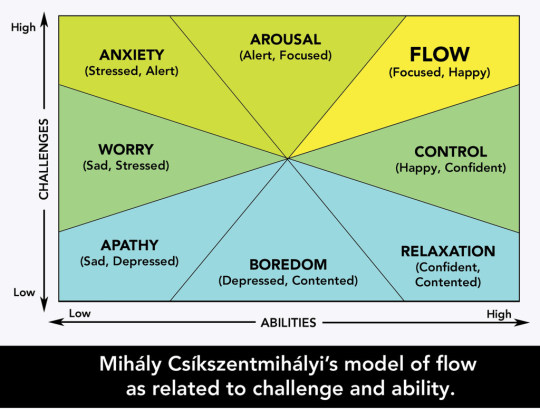
According to Cskszentmihlyi, The key element of an optimal experience is that it is an end in itself. You might need to complete the task youre working on for other reasons, but youd do it even if it werent required. Youre doing it not for some future benefit, but because the task itself is so rewarding. But heres the thing: Flow doesnt just happen. These optimal experiences can be encouraged and fostered. You can become happier by changing where you focus your attention. Garbage In, Garbage Out The objects and events around us exist in an objective world. They are what they are. Yet each of us experiences these objects and events in a different way. What happens outside must pass through the filter of your subjective mind before it enters your consciousness. You control what enters your consciousness (and, thus, what enters your awareness and memory). You and I go to the movies. We watch the same film in the same theater at the same time. You enjoy it. Youre wrapped up in the story and moved by the performances. I leave the theater unhappy. The kid in front of us coughed the whole time, I complain as we walk to the car. The seats were uncomfortable and the volume too loud. Plus, I dont like Nicholas Cage. We shared the same experience and yet we didnt. Consciousness corresponds to a subjectively experienced reality, Cskszentmihlyi writes in Flow. A person can make himself happy, or miserable, regardless of what actually happens outside, just by changing the contents of his consciousness. We choose what we experience, and we choose how we interpret those experiences. This idea can be challenging to people who possess an external locus of control, those who believe that their decisions and life are controlled by chance or fate or greater environmental factors. Cskszentmihlyi says that in order to achieve flow and happiness, we must actively create the conditions that lead to it. That means we must learn to direct our focus: [Happiness] is not the result of good fortune or random chance. It is not something that money can buy or power command. It does not depend on outside events, but, rather, on how we interpret them. Happiness, in fact, is a condition that must be prepared for, cultivated, and defended privately by each person. People who learn to control their inner experience will be able to determine the quality of their lives, which is as close as any one of us can come to being happy. The shape and content of your life depends on how you use your attention. People who master what happens in their heads tend to be happier than those who dont or wont. While we are thinking about a problem we cannot truly experience either happiness or sadness, writes Cskszentmihlyi. Therefore, the information we allow into consciousness becomes extremely important; it is, in fact, what determines the content and quality of life. The bottom line? Garbage in, garbage out. If you allow yourself to think negative thoughts, your experience will be negative. If you want a positive experience, you have to accentuate the positive in all that you see and do. We can make flow moments more common and become happier people by structuring our focus and attention to bring long-term improvements to the quality of our daily life. There are two primary ways to do this: Change external conditions.Change how you experience external conditions. Each strategy is sound. But one is generally easier than the other. Which path you choose depends upon the situation. Changing Your World Sometimes the best way to boost your happiness is by changing the world around you. Imagine, for instance, that youre sitting at home reading a book. Youre comfortable except for one thing: Youre warm. Very warm. An external condition is causing you discomfort. You could change the way youre experiencing this condition (by removing all of you clothes, say), but in this case it probably makes more sense to change the condition itself by lowering the thermostat. Or maybe youre sitting in a restaurant writing a letter. Things are fine except that the place is too noisy, which is distracting. Your best bet is to change locations, to change your environment. The trouble, of course, is that you have little control over the world around you. My girlfriend was born and raised in northern California. To her, thats the ideal climate. Shes lived in Portland for five years now, and she loves much about the city and the region. But she hates the climate. This is an external factor thats beyond her control. As hard as she tries, she cant make it rain less in Portland! (Francis Bacon once said, Nature, to be commanded, must be obeyed.) When you reduce the size of your immediate environment stepping from outdoors to indoors, for instance you make it easier to control external conditions. You cant reduce the outside air temperature, but you can cool a room or a building. Even then, exerting influence over your environment requires a great deal of effort and energy. Usually, the most effective way to boost your happiness isnt by changing external conditions, but by changing how you experience external conditions. Changing Yourself
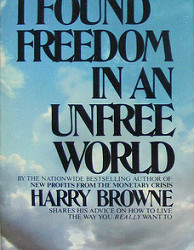
Now imagine youre reading in the park. Its cold. The sun is out, but the air is chilly. You could head indoors, but youre enjoying the lovely day. The solution is to change how youre experiencing the world around you. Put on your jacket and some gloves. You havent altered your environment, but youve changed how youre experiencing it. Or maybe youre backpacking through Europe, staying in hostels and cheap hotels. Sometimes its tough to sleep because the walls are thin and theres nothing covering the windows. Light and noise threaten to keep you awake all night. Again, the best solution is to change the way you experience the external conditions. If you wear an eye mask and earplugs, you can rest comfortably despite the chaos around you. Most people recognize that they have limited power over their physical world, but many cling to the belief that they can change the behavior of the people around them. In reality, changing others can be nearly as difficult. Writing in How I Found Freedom in an Unfree World a book well discuss at length in part three of this series Harry Browne calls the idea that you can (or should) control what others do the Identity Trap. He writes: [You cant] assume that someone will do what youve decided is right. Youve decided it from your unique knowledge and interpretations; he acts from his knowledge and his interpretations. Youre in the Identity Trap when you assume an individual will react to something as you would react or as youve seen someone else react. If youre unhappy with somebody, there are two options. You can attempt to change the other person, or you can change how you interact with that person. Youre almost always better off changing yourself altering your expectations, accepting new premises than you are attempting to change the other person. Heres Harry Browne again: You could make everyone else be, act, and think in ways of your choosing if you were God. But you arent. So its far more useful to recognize and accept each person as he is and then deal with him accordingly. You cant control the natures of other people, but you can control how youll deal with them. And you can also control the extent and manner in which youll be involved with them. The paradox is that you have tremendous control over your life, but you give up that control when you try to control others. For the only way you can control others is to recognize their natures and do what is necessary to evoke the desired reactions from those natures. Thus your actions are controlled by the requirements involved when you attempt to control someone else. People suffer a great deal of unhappiness because they assume that everyone wants the same things or that they should want the same things. But each person is different, with her own knowledge, experience, preferences, and attitudes. You can improve your quality of life by either changing your environment or by changing how you interact with your environment. Both strategies have their place, but one is generally much easier and more effective than the other. In most cases, its difficult or impossible to change the world around you. Attempting to do so simply leads to frustration and unhappiness. But its almost always possible to change how you perceive the world around you. In fact, its this ability that contributes most to day-to-day contentment. Permission and Control As children, were conditioned to ask permission whenever we want to do something. You need permission from your parents to leave the dinner table or to go outside and play. You need permission from your teacher to use the bathroom. Even as adults, we feel compelled to request permission. You need permission from your boss to leave work early. You need permission from your spouse to grab drinks with your friends instead of weeding the garden. You need permission from the city to build a shed in the backyard. As a result, most of us have developed an external locus of control. That is, we subconsciously believe we need permission to do anything. In personality psychology, the term locus of control describes how people view the world around them, and where they place responsibility for the things that happen in their lives. Though this might sound complicated, the concept is actually rather simple. If you have an internal locus of control, you believe that the quality of your life is largely determined by your own choices and actions. You believe that you are responsible for who you are and what you are.If you have an external locus of control, you believe that the quality of your life is largely determined by forces beyond your control, by your environment or luck or fate. You believe that others are responsible for who you are and what you are. Most people respond to the system of rewards and punishments that has evolved in the culture that surrounds them. If your culture prizes material gain, wealth becomes important to you. If it emphasizes familial relationships, family becomes important to you. But when you live like this when you make decisions based on your social environment the only happiness you can obtain is fleeting. As a result, many people suffer some degree of angst, of anxiety or dread. Is that all there is? we wonder, when we pause to reflect upon our lives. Isnt there something more? There is something more. Lasting happiness can be achieved, but not by being a puppet whose strings are pulled by situation and society. To achieve long-term happiness (and meaning), you have to develop the ability to find enjoyment and purpose regardless of your external circumstances. You have to create a system of internal rewards that are under your own power. If youre unhappy, nobody else can make things better for you. You must make things better for yourself. Focus on the things you can control, and use that control to fix the other things that are broken. In this way, youll gradually gain confidence and greater control of your future well-being. You live in a world of your own design. You have the power to choose. You create your own certainty. Life as you want to live, and do so without regret. Give yourself permission to do so. Caveat: Its okay to seek happiness by changing jobs or moving to San Diego. Its not okay to steal your neighbors television or to drive on the wrong side of the road. Remember the Golden Rule. Enjoy your life without diminishing the ability of others to enjoy theirs. Becoming Proactive Julian B. Rotter developed the locus of control concept in 1954 as part of his social-learning theory of personality. Stephen R. Covey popularized the idea in 1989 with his best-selling The Seven Habits of Highly Effective People. Like Mihly Cskszentmihlyi, Covey believes that we filter our experiences before they reach our consciousness. Between stimulus and response, he writes, man has the freedom to choose. Our self-awareness, imagination, conscience, and independent will give us the power to select how well respond to each situation in life. Covey says there are two types of people: proactive and reactive. Proactive people recognize that theyre responsible for how they respond to outside stimuli. In Rotters terms, they have an internal locus of control. They dont blame circumstances, conditions, or conditioning for their state. They believe their existence is largely a product of personal choice derived from personal values.Reactive people believe their condition is a product of their physical and social environments. They have an external locus of control. Their moods are based on the moods of others, or upon the things that happen to them. They allow the outside world to control their internal existence. To illustrate the difference between proactive and reactive people, Covey discusses how we focus our time and energy. We each have a wide range of concerns: our health, our family, our jobs, our friends; world affairs, the plight of the poor, the threat of terrorism, the state of the environment. All of these fall into what Covey calls our Circle of Concern. Within our Circle of Concern, theres a subset of things over which we have actual, direct control: how much we exercise, what time we go to bed, whether we get to work on time; what we eat, where we live, with whom we socialize. These things fall into what Covey calls our Circle of Influence, which sits inside our Circle of Concern.
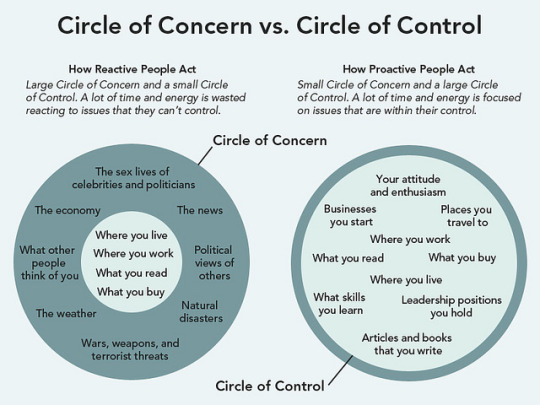
According to Covey, proactive people focus their efforts in the Circle of Influence. They spend their time and energy on things they can change. This has two effects. First, proactive people actually do affect change in their lives; and as they do so, their Circle of Influence expands. On the other hand, reactive people tend to focus on their Circle of Concern. They spend their time and energy on things theyre unable to influence (or can influence only with great difficulty). They try to change other people, to correct social injustices, to shift thought patterns of states or nations. Their efforts are largely frustrating and futile. Whats more, as they focus on their Circle of Concern, their Circle of Influence begins to shrink from neglect. Any time you shift your attention from your Circle of Influence to your Circle of Concern, you allow outside forces to control you. You place your happiness and well-being in the hands of others. If you dont act for yourself, youre doomed to be acted upon. But what about about luck? Arent there times when we really are at the mercy of the world around us? Of course. But our responses are always our own. Eleanor Roosevelt said, No one can hurt you without your consent. Covey agrees: Its not what happens to us, but our response to what happens to us that hurts us. Of course, things can hurt us physically or economically and can cause sorrow. But our character, our basic identity, does not have to be hurt at all. In fact, our most difficult experiences become the crucibles that forge our character. Shit happens. Shit happens to everyone. Ultimately, who we are and what we become is determined not by the shit that happens to us, but how we respond to that shit. Remember Reinhold Niebuhrs famous serenity prayer: God grant me the serenity to accept the things I cannot change, the courage to change the things I can, and the wisdom to know the difference. Most people are reactive. Its likely that youre reactive too at least to some degree. Dont fret. Im reactive also. But with time and effort, Ive managed to shift from an external locus of control to one thats primarily internal. You can too. Focus on the things you can control. Use that control to remove constraints and complications from your life. Strengthen and stretch your Circle of Influence. This is the only path to changing your Circle of Concern. You have no control over the hand youre dealt, but you can choose how to play the cards. Exercise: Heres a simple idea from Seven Habits. For thirty days, commit to working only on your Circle of Influence. How? Keep your commitments, to yourself and others. Dont judge or criticize other people, but turn your attention inward. Dont argue. Dont make excuses. When you make a mistake, accept responsibility and fix it. Dont blame or accuse. When you catch yourself thinking I have to or If only, stop yourself and choose to reframe the thought in a more positive light. As far as possible, accept responsibility for your circumstances, actions, and feelings. The Search for Meaning Victor Frankl was an Austrian psychiatrist who survived the Nazi death camps during World War II. The extreme suffering and harsh conditions caused many inmates to lose their will, to welcome death. To be sure, prisoners often had no control over whether or not they died. But Frankl observed, A man can, even under such circumstances, decide what shall become of him mentally and spiritually. He may retain his human dignity even in a concentration camp. When treated like an animal, Frankl said, a person can choose to be an animal or she can choose to be brave, dignified, and unselfish. According to Frankl, the way in which a man accepts his fate and all the suffering it entailsadd a deeper meaning to his life. In the classic Mans Search for Meaning, Frankl states his thesis thus: Everything can be taken from a man but one thing: the last of human freedoms to choose ones attitude in any given set of circumstances, to choose ones own way. Frankls experience served as a crucible for his theory of personality development, which he called logotherapy. Before him, Alfred Adler had argued that people possessed a Nietzschean will to power (more here), and Sigmund Freud had argued that were all motivated by a will to pleasure (more here). Frankl, on the other hand, believed that humans are born with a will to meaning, a fundamental need to discover their purpose in this world. The three basic tenets of logotherapy are: The search for meaning is the primary motivation in each of our lives. This meaning is unique and specific to each individual. (Frankls philosophy is one reason I ask Get Rich Slowly readers to do is create a personal mission statement.)Life has meaning under all circumstances, even the most miserable ones. What matters most isnt the meaning of life in general, but the meaning of each persons life in each moment.Humans are self-determining. That is, we dont just exist, but choose what our existence will be. We have freedom to find meaning in what we do and what we experience or at least in how we respond to each situation. Frankls argument that youre always free to choose your attitude is echoed in Mihaly Csikszentmihalyis statement that how we feel about ourselves, the joy we get from living, ultimately depends on how the mind filters and interprets everyday experience. It also echoes Johnstones Impro: People with dull lives often think their lives are dull by chance. In reality everyone choose more or less the kind of events that happen to them.
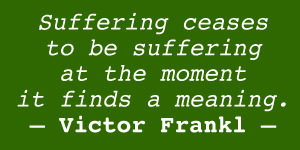
Accepting responsibility for your own fate and attitudes can be uncomfortable and intimidating. Theres a kind of solace when you can attribute your situation to the winds of fate, the whims of the gods, or the inner workings of the universe. But recognizing that youre a free agent can be liberating too. When you take matters into your own hands, you shed your fears, create your own certainty, and discover that youre freer than you ever imagined possible. If you struggle to know what youre life is about, youre not alone. I get email all the time from folks who are stumped about what it is they want to accomplish. They know they dont like how things are going, but theyre not clear on just what they should do to make things better. To finish this discussion of meaning and happiness, Im going to share three exercises designed to help you find direction. (If youve read my stuff at Get Rich Slowly before, youll probably recognize one of these. Thats okay. If you still need help finding your purpose, you should work through it once more.) First up, lets talk about how to prioritize how you currently spend your time. Your Big Rocks You lead a busy life. There never seems to be enough time to do the things you really want to do, the things that make you happy. Youre too preoccupied with work, errands, and other demands placed upon you by the outside world. In Work Less, Live More, Bob Clyatt argues that you can make time for the important stuff. The secret, he says, is to prioritize, and he offers an analogy. (Ive learned recently that this idea might have originated with Stephen R. Covey in his book First Things First.) Heres how it works: Imagine you have a jar. You want to fill this jar with some rocks and some sand. Whats the best way to do it? One way is to add the sand to the jar first and then add the rocks. If you did this, however, youd quickly find that its impossible to make everything fit. With a layer of sand at the bottom of the jar, theres no room for the rocks.On the other hand, if you begin by putting the rocks in the jar, when you pour in the sand it will sift downward to fill in the gaps and the cracks between the rocks. Everything fits. Heres a video that demonstrates this idea in action: [embedded content] This same principle applies to your personal life. You can achieve well-being by prioritizing the Big Rocks in your life. This may sound elementary, and you may be tempted to ignore this advice. Dont. This one idea revolutionized my life. It made me happier and more productive. By focusing solely on the things that were most important to me by making room for the Big Rocks I was able to reclaim my life and time. A few years ago, after first reading about this idea, I sat down and drafted a list of the things that were most important to me. I decided that my Big Rocks were fitness, friends, writing, Spanish, and travel. If these werent in my jar, I wasnt happy. So, I made sure to squeeze these in before anything else. Once these rocks were in place, once these things were on my calendar, then Id fill the remaining space with the sand television, email, errands, and so on. Because of this simple exercise, I got lots more done and had a better time doing it. Who Are You? and What Do You Want? In order to get things done, to be productive, to achieve greater meaning and happiness in your life, you need to make sure youre spending more time on the big rocks and less time on the sand of everyday life (such as errands and email). But how can you determine which things are important? George Kinder is a Certified Financial Planner. Unlike many CFPs, Kinder isnt just about the nuts and bolts of money. He moves beyond the numbers in an attempt to address the goals and values of his clients. Without life planning, he says, financial planning is like using a blunt instrument on the organism we call the human being. Near the beginning of his work with each client, Kinder challenges her to answer three questions. These questions are designed to lead the client deeper and deeper into her desires until they reveal her goals and values, the things that bring her meaning and purpose. Kinder shared these questions in his book, The Seven Stages of Money Maturity. Your next task is to set aside half an hour to answer Kinders questions as honestly as possible: Imagine youre financially secure. You have enough money to take care of your needs, both now and in the future. How would you live your life? Would you change anything? Let yourself go and describe your dreams. What would you do if money were no object?Now imagine that you visit your doctor. She reveals you only have five to ten years left to live. Youll never feel sick, but youll have no notice of the moment of your death. What will you do in the time you have remaining? Will you change your life? How will you change it? (Note that this question does not assume unlimited wealth.)Finally, imagine your doctor shocks you with the news that you only have 24 hours to live. Nothing can be done. At this time tomorrow, youll be dead. What feelings arise as you confront your mortality? What did you miss? Who did you not get to be? What did you not get to do? Answering the first question is easy (and fun). There are many things wed do if money were no object. But as the questions progress, theres a sort of funnel. They become more difficult to answer, and there are fewer possible responses. Life planning is all about answering that final question. Note: If youd prefer, you can download a free PDF with a similar exercise that I used in the Money Boss crash course: Your Personal Mission Statement. Someday, Ill update that for Get Rich Slowly. According to Kinder, the third question usually generates responses that follow five general themes: Family and relationships. Ninety percent of responses to the final question contain this topic.Authenticity or spirituality. Many responses involve leading a more meaningful life.Creativity. Surprisingly, a large number of respondents express a desire to do something creative: to write a science-fiction novel or to play guitar like Eric Clapton.Giving back. Further down the list are themes about giving back to the community, about leaving a meaningful positive impact.A sense of place. A fifth common theme (though nowhere near as prominent as the top three) is a desire to have some connection with place: a desire to be in nature, to live someplace different, or to help the environment. Kinder says that some people the facts and figures people look at the life-planning process and ask, What does this have to do with money? It has everything to do with money. When you understand what you want to do with your life, you can make financial choices that reflect your values. All of these questions and the entire life-planning process are meant to cause the participant to ask herself, Who am I as a person, stripped from what I do as a job every day? Is it possible to derive meaning and satisfaction with this stripped away? Inevitably, the answer is yes. Your Lifeline Heres a third and final exercise, which I picked from my friend Jim Collins. Youre going to create a graphical representation of your life past and future. Before we start, grab a piece of paper and a pencil. Ready? Great! Heres how this works. Step one. With the paper in landscape mode (wider than it is tall), place one dot on the center of the left side. Place a second dot on the center of the right side. Draw a line to connect the two dots. Your page should look something like this:
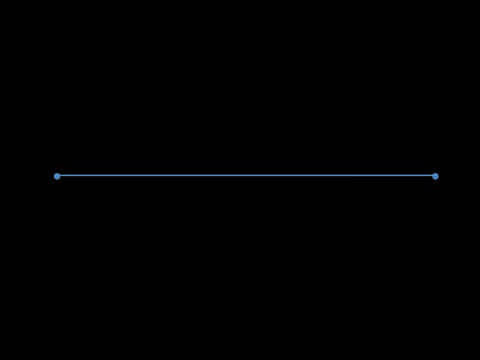
Step two. For the next step, youll need to do some guesswork. Based on what you know of your health and your family history, estimate how long youll live. I know theres no way to be sure you could be hit by a truck tomorrow, or maybe next week scientists will find the secret to living 1000 years! but do what you can to best guess the date of your death. (If you need help, try one of the many on-line longevity calculators, such as the one at livingto100.com.) Once youve calculated your projected date of death, write it below the right-most dot. Example: As my long-time readers know, the men in my family dont live long. In fact, they often die on or around their fiftieth birthdays. Also, for strange reasons known only to the universe (or god), many of my family die on or around Independence Day. Thus, I often say that I expect to die on 04 July 2019, when Im fifty. This may sound morbid, but I like to think of it as hedging my bets. I hope to live longer, but Im fully prepared to have a short life.
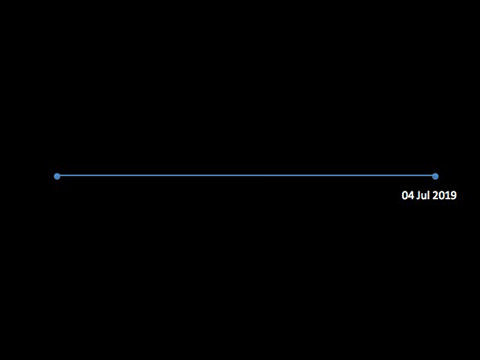
Step three. Below the left-most date, note your date of birth. On your paper, youve created a visual representation of your lifeline.
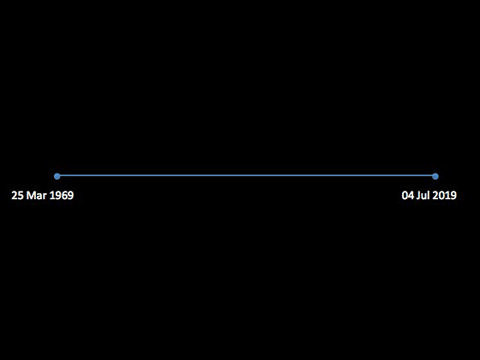
Step four. The next step requires a bit of math. Youre going to add a third point to your lifeline, a point that represents today. Today will fall on a different point on the line for each person. To find the proper place for you, divide your current age by your expected lifespan. For instance, Im 45 and expect to live until Im 50. For me, the point representing today is located about 10% from the right side of the line. If youre 20 and expect to live until youre 80, your today point would be about one-quarter of the way in from the left. And so on.
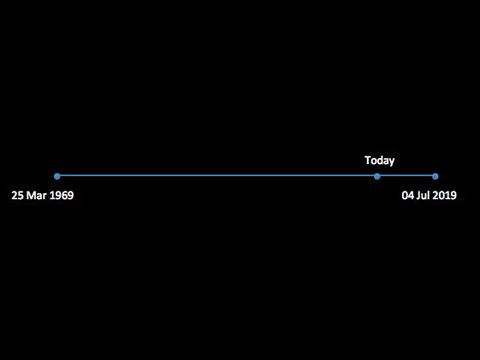
Step five. Finally, choose a handful of major events from your life and place them on the lifeline in (approximately) the appropriate location. You might choose to list your first day of school, your wedding date, or the birthdates of your children. Add three to five major events to your lifeline. Example: On my lifeline, Ive included these key events: Writing The Meanest Inchworm in third grade, which was the first clue that Id one day become a writer. Getting married. Writing my first blog. Selling Get Rich Slowly. Re-purchasing Get Rich Slowly.
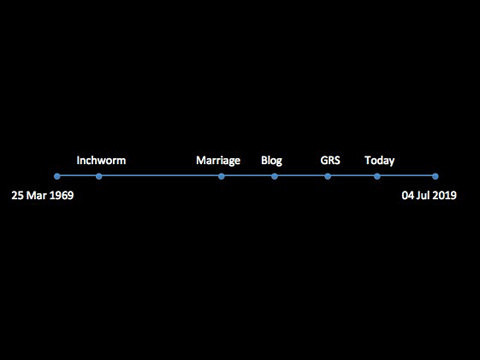
Your lifeline is now complete. On the piece of paper before you, you have a representation of your life, both past and future. But before were finished, theres one final step Id like you to take. Using an eraser, a marker, or another piece of paper, mask everything on your lifeline that comes before today. Blot it out. Hide it. Make it go away.

All of the time before today is past and does not matter. What matters is the future: today and everything after. For folks like me, our projected futures contain just a small amount of time. Knowing that, I cannot wait to do the things that I want to do. If your projected future is short, you shouldnt wait either. Dont dwell on the past. You cant change it. Focus instead on making the best quality tomorrow you possibly can. On the other hand, if your projected future is long (say youre 20 and expect to live another 60 or 80 years), cultivate patience. Take time. Make smart choices. Do what you can to set yourself up for future success. And dont get down on yourself just because youve made a few mistakes in the past. The past is the past. Look how much tomorrow lies before you! For another take on this exercise, take a look at the life calendar from Tim Urban at Wait But Why. The Path to Purpose We covered a lot of material in this article. Lets review what weve learned.
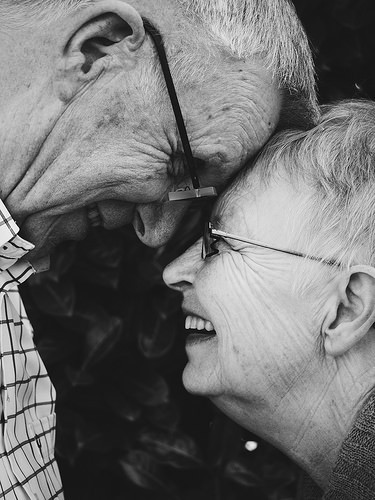
You can improve the quality of your daily life by learning to focus your attention and choosing to filter your experiences through a lens of positivity. But while it might be simple to find happiness in a single day, it can be much more difficult to link a series of days into a meaningful whole. Still, just as we must be active agents in creating our own happiness, we must also take an active role to create meaning in our lives. Creating meaning involves bringing order to the contents of the mind by integrating ones actions into a unified flow experience, writes Mihly Cskszentmihlyi. To give meaning to life, to achieve this unified flow experience, you need a purpose an overall goal around which your lesser goals are clustered. The path to purpose is different for each of us. Exercises like those Ive shared here the big rocks, the three questions, and the lifeline can help you identify your personal purpose, but often this process requires many years of experience and soul-searching. Dont feel bad if you havent found your purpose. And be aware that it takes more than cultivating purpose to make meaning out of life. To make meaning, you must also forge resolve. You must take your goals seriously. If youre not willing to accept the consequences of the goals you set, or to put in the effort required to achieve them, those goals become meaningless. Curiously, it can often be easier to find meaning and purpose by limiting your options. The more choices we have, the more difficult it is to maintain our resolve. Commitment to a goal and to the rules it entails is much easier when the choices are few and clear, notes Cskszentmihlyi. When we can imagine only few opportunities and few possibilities, it is relatively easy to achieve harmony. Desires are simple, choices are clear. There is little room for conflict and no need to compromise. Because life is complex (and becoming more so every day), its vital to keep your psychic energy focused on the things that matter most. Exercising personal restraint and preferring simplicity can help you stay glued to your purpose, on your goals both big and small. Restraint and simplicity reduce the possibility of distraction. But restraint and simplicity arent enough. When life gets busy and you feel overwhelmed, you must do more than just simplify your environment. At these times, action and intensity become your allies. Harmony is restored to conscious indirectly not by facing up to contradictions and trying to resolve conflicting goals and desires, but by pursuing chosen goals with such intensity that all competition is preempted, writes Cskszentmihlyi. Action helps create inner order. Action cures fear; apparently, it also imparts purpose. The final piece to the making of meaning is self-knowledge, the process by which you sort through conflicting choices. Based on your personal history, preferences, and passions, you must filter the available options to select the goals that truly reflect who you are and what you mean to the world. Example: At any given moment, I have many options available to me. Do I want to write another book? Do I want to speak at a conference in India? Do I want to continue to write about money? Do I want to study Spanish? Do I want to travel more? Less? And so on. Most of these options are good (by which I mean theyre positive, both for me and for the world). Who I am and what my life means is a product of the opportunities I choose to pursue. Ultimately, its up to each of us to discover our lifes purpose though a combination of simplification, action, and self-reflection, by being true to who we are and what we believe, and be setting goals we find worthy of pursuing for their own sake. Shares 104 https://www.getrichslowly.org/how-to-be-happy/
0 notes